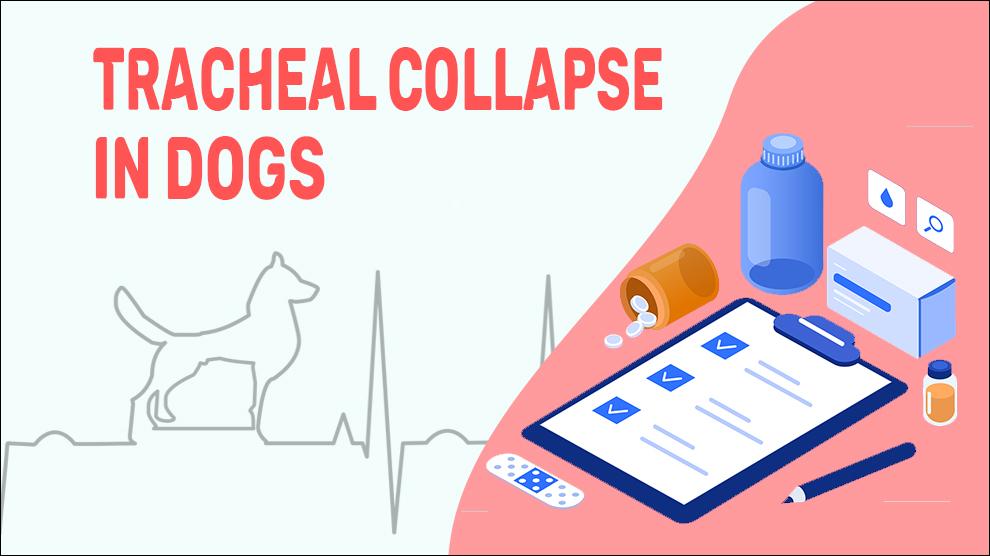What Is Tracheal Collapse In Dogs?
Tracheal collapse is an inherited, chronic, irreversible, progressive disease of the trachea (windpipe) and mainstem bronchi collapse (lower airways). Small and toy breed dogs are more predisposed to tracheal collapse and often associated with respiratory distress and/or cough. Tracheal collapse occurs most commonly in middle-aged to old dogs; however, it can occur in dogs of all ages, sizes, and breeds.
Genetics largely affects the severity of the tracheal collapse. The dogs affected severely are typically recognized at a young age itself; dogs that are less severely affected may not reveal signs until a middle or older age.
The trachea is a flexible tube connecting the larynx to the bronchi of the lungs. C-shaped hyaline cartilaginous rings connected to each other by elastic connective tissue placed externally along the tracheal wall maintain the tube shape of the trachea. In dogs, these rings do not totally enclose the windpipe, but almost 83% of the circumference is covered. The circle is completed by a thin membrane of tissue.
When cartilage rings lose some turgidity (rigidity and strength), or the membrane becomes slackened, when air is drawn into the airway during inspiration then the tracheal rings get compressed. This is called tracheal collapse. The collapse of the Trachea means it is difficult for air to get to the lungs.
Tracheal collapse may affect the thoracic, cervical inlet, or intrathoracic trachea, and the disease progression over time results in additional areas of collapse. The intrathoracic disease is associated with expiratory distress/ collapse and the Cervical disease is associated with inspiratory distress/ collapse.
Symptoms Of Tracheal Collapse In Dogs
- Acute onset of a dry, harsh cough
- Loud cough (describe as a 'goose honk')
- Rapid/labored breathing
- Abnormal breathing sounds
- Bluish tinge to the gums
- Fever
- Runny eyes and nose
- Loss of appetite
- Swollen tonsils
- Wheezing
Severe cases
- Tachypnea
- Bronchopneumonia
- Respiratory distress
- Pyrexia
Treatment Options For Tracheal Collapse In Dogs
There is no specific treatment available for Tracheal collapse in dogs.
- For severe collapse: Insertion of either internal or external stents
- Anti-inflammatory medications: Cyclosporine (Atopica), Cortisone (dexamethasone, prednisone, prednisolone), Azathioprine, leflunomide, and mycophenolate mofetil
- Antibiotics: Metronidazole(Flagyl), Amoxicillin/Clavulanate (Clavamox), Gentamicin, Chloramphenicol, Sulfamethoxole, Tetracycline, etc
- Cough suppressants: Dextromethorphan, Hydrocodone Maropitant, Balminil, Delsym, Benylin)
- Anti-anxiety medications: Alprazolam (Niravam), Clomipramine (Anafranil), Dexmedetomidine (Dexmedesed), Diazepam (Diastat, Valium), Fluoxetine (Sarafem, Reconcile or Prozac), Paroxetine (Brisdelle), Sertraline (Altruline, Anilar), etc
- Bronchodilators: Theophylline, pentoxifylline, terbutaline, and aminophylline
Home Remedies For Tracheal Collapse In Dogs
- Provide your dog’s low-calorie and low-fat diet.
- Make sure that your dog gets appropriate medications.
- It is advisable to keep your dog’s living area clean and sterile.
How To Prevent Tracheal Collapse In Dogs?
- There are no dependable methods to prevent Tracheal collapse in dogs since it is hereditary. t is better to weed out the affected dogs when breeders think about breeding or check the roots before you get a dog from a susceptible lineage.
- Check your dog’s habits as some dogs may have a stronger instinct to consume foreign objects.
- Keep little objects that could be swallowed out of their reach.
- Properly check all chew toys and stuffed animals before giving them to your dogs.
- Don’t leave any remnants, sharp pieces, and trash out of reach of your pets.
- Consult your veterinarian at once if you find any odd coughs or breathing sounds.
Affected Dog Breeds Of Tracheal Collapse
Small Dog Breeds, Toy Dog Breeds, Chihuahua, Pomeranian, Shih Tzu, Lhasa Apso, Toy Poodle, Yorkshire Terrier
Causes And Prognosis For Tracheal Collapse In Dogs
1. Causes:
- Genetic in small and toy breeds (Chihuahua, Lhasa Apso, Maltese, Pug, Pomeranian, Shih Tzu, Toy Poodle, Yorkshire Terrier)
- Age (most common in dogs > 5 years of age)
- History of respiratory infections
- Too much activity
- Obesity
Other risk factors:
- Chronic respiratory diseases
- Cushing's disease
- Exposure to cigarette smoke
2. Morbidity:
- Tracheal collapse symptoms start off with symptoms similar to viral infections
- Signs vary from loud cough and slight fever to pneumonia
3. Mortality:
Young dogs have the highest mortality rate and overall it ranges from 0.1%
4. Diagnosis:
- Abdominal radiograph
- Computerized tomography
- Gastrointestinal transit studies
- Barium small bowel series
5. Prognosis:
The important thing to note is that tracheal collapse is a progressive disease, as the tracheal cartilage will continue to get worse over time regardless of treatment. Even pets that undergo surgery may often need medications for life. Although complete recovery is not possible, pets can typically able to continue with daily activities. Generally, when the collapse cancer is detected early, before any further progression, treatment may be effective.
When To See A Vet For Tracheal Collapse In Dogs?
Contact your vet right away, if you notice any of the following:
- Acute onset of a dry, harsh cough
- Loud cough (describe as a 'goose honk')
- Rapid/labored breathing
- Abnormal breathing sounds
Food Suggestions For Tracheal Collapse In Dogs
- Low-carb dog food: Carrots, peas, squash, sweet potatoes, Spinach Greens, yams, pumpkin, etc
- Lean, home-cooked, or boiled meats (chicken, beef, turkey, fish)
- Green Leafy Veggies: Kale, cabbage, spinach, and swiss chard
- Antioxidants- Blueberries, blackberries, spinach, Steamed broccoli, kale, cooked yellow squash, and green beans
- Iron: Lean meats like lamb, ground beef, and fish, such as sardines and salmon, carrots, leafy greens, and pumpkins
- Oily Fish such as Salmon, anchovies, tuna, Sardines, Cod, Herring, Lake trout, and Mackerel (omega-3 fatty acids)
Conclusion
Treatment and subsequent prognosis will vary depending on the specific underlying defect of the dog.
Congenital conditions may need lifelong management and often cannot be “cured.”
The clinical signs acquired due to most of the underlying conditions (except malignancies and a few other chronic conditions) can be controlled by proper treatment.

















